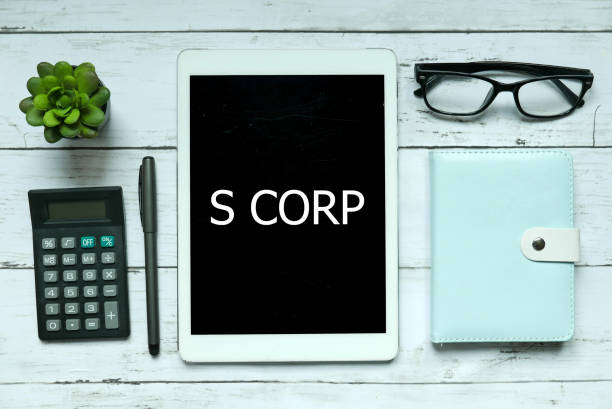There are some situations where it’s better to be a traditional C Corporation than an S Corporation. But for many small businesses, in particular, it is better to be an s-corp than a c corp. You may have heard that there are tax advantages to being an S Corp, and this is true! But there are also other benefits of becoming an s corp that you might not have considered before making this decision:
S Corporations are taxed less.
S corporations are taxed less than C corporations. Taxes paid by an S corporation are based on the income of the business and not its profits. In other words, you pay taxes on what you earn, not what you make. This means that if your company loses money in a particular year due to business expenses or other reasons, tax rates won’t affect your bottom line as much as they would with a C corporation.
If there is a capital gain made by an S corporation shareholder when they sell their shares—the amount left over after all debts have been paid off—that amount will be subject to capital gains tax at whatever rate is applied to ordinary income for that individual shareholder at the time of sale (which may vary).
Related: How is an S Corporation Taxed
S Corporations provide limited liability protection.
Limited liability protection is one of the biggest benefits of S corporations, but it’s not always easy to understand. A good explanation is “the shareholders are the business.” This means that the shareholders are liable for any debts and obligations of their company, so long as they don’t go beyond what was agreed upon in their operating agreement or by state law.
So how does limited liability work? It starts with three key players: (1) a corporation; (2) its shareholders; and (3) when it comes time to pay the bills or make legal decisions, an agent like an officer who acts on behalf of the company.
When something goes wrong with your business—an employee gets injured at work or you’re sued over some action taken by your company—the person whose name appears on those papers as an agent for your S-corp is liable for damages up to his or her net worth minus his or her contributions toward equity in the S-corp.
In other words, if someone in authority within your organization causes harm that leads to lawsuits being filed against them personally, their family members will not incur any losses from these liabilities because they aren’t part owners of this hypothetical business structure known as an “S.”
S Corporations protect the business from personal liabilities.
Another benefit of operating as an S Corporation is that the business owner’s personal assets are protected from liability claims. In other words, you’re not personally liable for your company’s debts or lawsuits.
By default, when you form a corporation as a sole proprietor or partner, you become personally responsible for all of the debts and liabilities of your business. But in an S Corporation, shareholders have limited liability protection so they can’t be held responsible for any of the company’s actions—as long as they follow their shareholder duties.
This benefit is often most important to small businesses that sell products because it protects them from being sued by customers who may be injured by their products. The law does have some exceptions though: if someone gets hurt on your property due to negligence (for example), then they may be able to sue both yourself and your corporation; however, even in these cases there will be limits on how much money they can recover from either entity.
S Corporation taxes are easy to understand.
S Corporations are a type of “pass-through entity,” which means that the corporation itself does not pay taxes. Instead, the profits from the business flow through to shareholders without tax being applied at either level. There is no double taxation—only once at the corporate level and again when distributed as dividends—and this makes it easy for small business owners who want to reduce their tax payments by forming an S Corporation.
Some additional features that make life easier for small businesses include:
- No personal income tax or self-employment tax
- No withholding tax on salaries or other distributions to shareholders
- No estimated tax payments (except in certain circumstances when there is capital gain)
Related: How to Convert an LLC to S Corporation
S Corporations are flexible.
If you’re a small business owner, you know the importance of flexibility. What if your business grows so much that one office isn’t enough? Or even if it doesn’t grow?
S Corporations offer more flexibility than other types of corporations with regard to how many offices, directors, and shareholders they have.
In addition to having multiple shareholders and directors within an S corporation, there can also be more than one bank account. This is advantageous for businesses that need separate accounts for different financial functions such as payroll accounts or accounts used to collect payments from customers like invoices or credit cards.
S Corporations can have more than one class of stock.
One of the most notable benefits of S corporations is that they can have more than one class of stock. This means that you can set up your corporation in such a way that it has two or more different classes of stock, each with its own voting rights and dividend payout provisions.
It’s important to note that an S corporation cannot issue preferred shares (shares with special rights). If you want to create special classes of shares with specific terms and special rights, then you need to incorporate them under state law as well as federal law (check out our guide on LLCs vs C-corporations if this sounds foreign).
For many small businesses, in particular, it is better to be an s-corp than a c corp.
The benefits of S Corporations for small businesses, in particular, are numerous. For many small businesses, it is better to be an s-corp than a c corp.
- More tax benefits: As an s-corp, your business won’t have to pay corporate or personal federal income taxes on its profits. Instead, the profits will be passed through and reported on your personal tax return as salary income (or possibly dividends).
- More flexibility: Unlike a c corporation, an s-corp allows you to make decisions regarding how your company operates without requiring shareholder approval. This makes it easier to run your business without needing constant input from investors or other shareholders.
- Better asset protection: Since you own all of the assets in your s-corp personally, those assets are protected from creditors by law—unlike the corporate structure where the assets can be seized for reasons unrelated to their value in helping run the business (e.g., if someone sues because they fell off a chair onto sharpened pencils at work).
Conclusion
In general, S Corporations are the best option for small businesses. They provide limited liability protection, flexibility, and tax savings. This means they can be an excellent choice even if you’re not sure whether you’ll need a separate company or not. If you’re thinking about starting your own business or have already started one, then consider looking into how an s corp might help you grow it even further!



